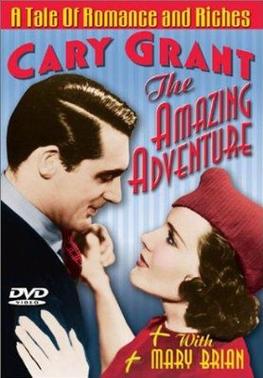The Rich Really Are Different From You And Me, Part II-Cary Grant’s “The Amazing Adventure” (1936)-A Film Review
DVD Review
By Frank Jackman
The Amazing Adventure (In England released as The Amazing Quest of Ernest Bliss), starring Cary Grant, Mary Brian W1936
F. Scott Fitzgerald caught the essence of the truth that the rich, by that in his time he meant millionaires and such today it would have to be billionaires, the really rich, the controlling rich are different from you and me. Lifestyle, concerns, power, hell, even not worrying for one minute where the next meal is coming from and whether one has a roof over his or her head that preoccupies the rest of us. That is the hidden premise behind this early Cary Grant film The Amazing Adventure (can’t say much for the nondescript film title which sounds like a title for a kid’s movie) where the rich, or one rich heir to a London fortune can renounce wealth and go on the bum-for a while.
Poor little idle rich boy heir to a pile Ernest Bliss, played by a young versatile Cary Grant, is down in the dumps. Reason. Life as a poor little idle rich heir is not what it is cracked up to be and well boring by his lights. As many people do, maybe more these days than then, Ernest checks with a doctor to see what is wrong with him. Being idly rich is the good doctor’s diagnosis with a poor prognosis for recovery. That little slap on the face irks dear Ernest and he decides to go on the bum for a year after making a big bet with the doctor who, maybe rightfully, believed this idea was a non-starting among the Mayfair swells according to his experience.
Looking for work for a guy without any references in Great Depression era London though is a tough sell. But before long our boy is walking the streets as a salesman for ovens. Works that racket so well turning dross into gold for his boss that he decides he has to move on to some other line of work when the boss wants to make him a partner. Of course not before wowing the boss’s secretary Frances, played by no name Mary Brian, taking her from right under the very interested in her boss’s nose. Eventually he grabs work as a chauffeur and that is where things get dicey. See that boss wants to marry Frances but she loves Ernest but has to look out for a better prospect than a lowlife cabbie so she leaves the boss’s employee as well in a quandary.
After a few frankly less than amazing adventures including an attempt to scam Ernest by some white collar criminals and a rousing of Frances’ new employer who is thinking about silky sheets and not her typing skills Ernest finally asks Frances to marry him. But fate plays fickle here since Frances’ sister is at death’s door and needs some serious and expensive medical attention. Lowlife cabbies don’t count at that point and she agrees to marry the oven king. Don’t forget this is Cary Grant she is throwing over so you know in the end she will bounce back into his arms. How? Ernest finds out why Frances flew the coop on him and finally reveals who he really is. He loses the bet since the year is not up but gains a wife. Ho-hum.
There have been a spade of books of late touting the advantages of shedding lots of material things which are not necessary. Buy only what you absolutely need and use recycled stuff to divest yourself from the deep consumer society which has plagued America. There is some good to this idea but I noticed that the authors were all relatively well-heeled when they decided to chuck stuff and live simply. And stayed relatively well-heeled even after shedding material goods. What the knock on these New Wave self-help books is though is informative as well. It is a very good thing for the well-heeled to cut back. But what about those masses of people living on a few dollars a day, those “from hunger” as we use to say in the old working poor neighborhood I grew up in. They don’t have that storybook luxury down at the base of society when food on the table and a roof over the head keeps them up nights. That is where the idea behind Ernest’s moment of renunciation belongs as well. Yes, the very rich are different from you and me in a lot of ways, a whole lot of ways.

No comments:
Post a Comment